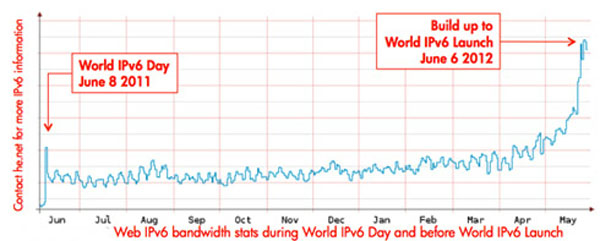Things to know about IPv6 protocol
On June 6, 2012, according to the initiative of Internet Society (ISOC), the world's leading technology and digital content firms such as Google, Facebook, Yahoo . simultaneously launched services and applications in the background. IPv6.
Internet protocol version six (IPv6) is a major upgrade from the IPv4 standard with the aim of resolving IP address exhaustion due to the increasing number of Internet-connected devices.
In fact, IPv6 has been around for quite some time and still has a long way to go. The transition to IPv6 is not simple, so many organizations and companies operating on the Internet have agreed to choose World IPv6 Launch event on June 6.
Why is IPv6 inevitable?
Simply because the IPv4-based Internet address store is about to run out (IP is the numerical sequence for each computer, server, smartphone and other Internet-connected devices). It has a total of 4.3 billion addresses and has been running out while new devices continue to be massively marketed.
Vint Cerf, who created the IPv4 protocol with the task of connecting computers across the globe, said: " I think that as an experiment and 4.3 billion addresses is more than enough. Who knows in advance? How much address space will we need, especially when the IPv4 IP address is not yet existed?
IPv6 is the solution. Each IPv6 address has a length of 128 bits, allowing an address extension of up to 2 ^ 128, which is much larger than IPv4 (the specific number of addresses of IPv6 will be 340.282.366.920.938.463.463.374.607.431 .768.211.456).
The problem here is that the process of upgrading the Internet to IPv6 requires a lot of effort and cost, so most people still hesitate until they cannot delay.

The vastness of IPv6 addresses (128 bits) compared to IPv4 (32 bits).
How is IPv6 deployment?
People have been able to open IPv6 networks since 1999, but administrators still don't feel motivated. It took more than a decade for this to change. IPv6 is currently activated and maintained by more than 1,500 websites and ISPs in 22 countries. This is a small number but will soon spread. Cisco predicts there will be 8 billion devices allocated IPv6 addresses by 2016, up from 1 billion in 2011.
The main websites of Google, Microsoft, Facebook and Yahoo are compatible with IPv6. Yahoo said Yahoo Sports, Yahoo Mail and Yahoo Finance services will also support in the next few months.

The number of IPv6 deployments has increased positively compared to last year.(Source: Hurricane Electric).
Is there any problem with the IPv6 transition?
Yes, but will only affect a small number of users. On the occasion of World IPv6 Day 1 year ago, Yahoo has listed the number of affected visitors because of IPv6."A few weeks before World IPv6 Day 2011 took place, the conversion affected about 0.055% of users. A week later, this number dropped to 0.022%," Yahoo said.
What happens if an IPv6-based computer accesses an IPv4 website and vice versa? It is possible that during the transition phase, the user will encounter a message that the site does not exist, or that the firewall installed on their machine does not recognize IPv6, it should block or slow down the process of accessing the website. . However, usually, companies deploying IPv6 will have tools and software to facilitate communication between IPv4 and IPv6.
"People need to understand that this is the infrastructure they are dependent on. It needs to change to continue to expand. Businesses cannot grow without enough addresses to use." of Internet Vint Cerf stressed that despite acknowledging that the two address systems are not compatible, there will be a small portion of users who are unable to access the site, resources and web services.
The event of World IPv6 Day 2011 and World IPv6 Launch 2012 is an opportunity to attract more companies and organizations to participate in the conversion, and find out the technical issues arising in practical implementation.